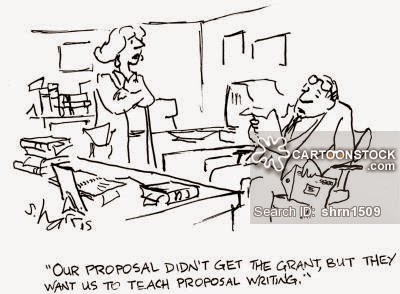In a post last year A survival and sanity guide for new faculty I suggested that they should not apply for every grant possible or take on every prospective graduate student. I was asked to write something about what criteria might be used for making these decisions. Here, I will just focus on the grant issue. Hopefully, later I will discuss students.
First, you should acknowledge that you do have a choice. Don't let pressure from others make you think you don't. Alternatives to not applying including waiting for a year, or putting in an application jointly with another colleague.
This is a tricky and subjective issue for which there is no clear answer. Here, I will suggest some questions to ask yourself.
Do I really need the grant?
Do I actually need the money to do the research? Or do I need the grant for career reasons? If you are an experimentalist and have no ongoing funding to pay for supplies such as liquid helium then there is a very good reason to apply. On the other hand if you are a theorist and already have several students, getting a postdoc might be nice, but hardly essential.
If your institution won't give you tenure without this particular grant then you obviously should apply. On the other hand, if you want to get the grant largely because it is "prestigious", maybe you should give it a miss.
How much work is involved in the application?
Many applications run to 50-100 plus pages and can take up most of your time for 2 to 4 weeks. Be realistic. It will take longer than you think, particularly if you are inexperienced and don't have administrative/secretarial support. It can also be very stressful trying to write an application while juggling many other responsibilities.
What is the opportunity cost of applying?
Would all this time and energy be better spent doing something else: increasing the quality of a different grant application, writing a paper, actually doing research, spending more time with your current group members, ... going on a vacation! These alternatives may increase your chances with other funding opportunities. These alternatives may also be a lot more worthwhile and enjoyable.
What are my chances of success?
Be realistic. Many grant programs, particularly in the USA, are now down to less than ten per cent. But, it is not completely random. For some applicants, the chances will be significantly higher, for others, even lower. To help evaluate your chances ask,
Do I know someone, particularly a peer, who got one of these grants?
Look at the list of successful previous applicants. Consider their research fields, track records, "visibility", and political connections (especially to the decision makers). Are they comparable to yours?
To help decide, if possible ask the advice of a senior person without a vested interest who will be objective and honest.
I welcome comments and suggestions.
Subscribe to:
Post Comments (Atom)
A golden age for precision observational cosmology
Yin-Zhe Ma gave a nice physics colloquium at UQ last week, A Golden Age for Cosmology I learnt a lot. Too often, colloquia are too speciali...

-
This week Nobel Prizes will be announced. I have not done predictions since 2020 . This is a fun exercise. It is also good to reflect on w...
-
Is it something to do with breakdown of the Born-Oppenheimer approximation? In molecular spectroscopy you occasionally hear this term thro...
-
Nitrogen fluoride (NF) seems like a very simple molecule and you would think it would very well understood, particularly as it is small enou...




No comments:
Post a Comment